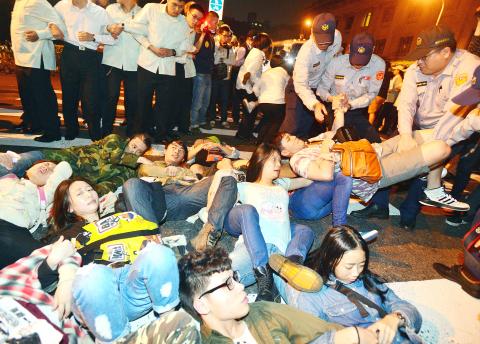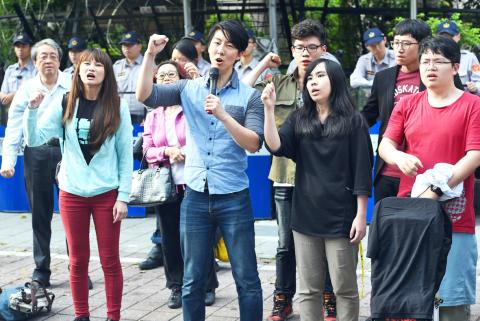Following the government’s announcement that it had asked China’s Taiwan Affairs Office (TAO) to forward its application to join the Asian Infrastructure Investment Bank (AIIB) on Tuesday, hundreds of people rallied outside the Presidential Office Building late into the night and into the morning yesterday to protest the move.
Holding banners and shouting slogans accusing President Ma Ying-jeou (馬英九) of being a traitor, a crowd of more than 30 people — mobilized by several student activist groups, including the Black Island National Youth Front and Democracy Tautin — gathered in front of the Presidential Office Building without prior notice at about 9:30pm on Tuesday night.
Military police officers in charge of maintaining security reacted quickly to stop the protesters and surrounded them.

Photo: Wang Yi-sung, Taipei Times
Severe clashes broke out when military and civilian police officers — who rushed to the scene after the activists arrived — tried to forcibly remove protesters, and at least one protester was handcuffed, while several protesters and officers were wounded.
Although initially there were just slightly more than 30 protesters, more people arrived after learning about the event through the Internet and news reports.
A second wave of clashes broke out when the newly arrived crowd stood in front of two police buses in an attempt to block the police from taking away those they had arrested.

Photo: Lo Pei-der, Taipei Times
The blockade continued for about half an hour, until police cleared the road.
“We are here to voice our opposition to the government’s AIIB membership application under the ‘one China’ principle through the TAO,” Democracy Tautin deputy convener Wu Cheng (吳崢) told the crowd.
“If Taiwan wishes to join the AIIB, then we should apply to it directly, not through a Chinese government agency. That is tantamount to saying that we are part of China,” Wu said.
Black Island National Youth Front member Lai Yu-fen (賴郁棻) said that, should the government not cease its self-degrading behavior, “our actions today will only be the beginning.”
The tension between law enforcement and protesters diminished as more people turned up to show their support for the protesters; there were between 300 and 400 people present by about midnight.
Moreover, others delivered water and food to the protest, while a medical aid station was also set up.
A minor incident occurred when a police officer chased a woman who crossed the police line, which was set up at about 2am to prevent more people from moving in. The officer found himself surrounded by an angry crowd and was trapped until his colleagues rushed to his rescue a few minutes later.
The standoff continued until after 4am, when police lined up to drive the crowd away.
The crowd left with no resistance, but moved to the Mainland Affairs Council headquarters nearby, where they held a news conference at 7am explaining their actions.

‘ONE BRIDGE’: The US president-elect met with Akie Abe on Dec. 15 in Florida and the two discussed a potential Taiwan-China conflict’s implications for world peace US president-elect Donald Trump has described Taiwan as “a major issue for world peace” during a meeting with Akie Abe, the widow of late Japanese prime minister Shinzo Abe, Japanese newspaper the Yomiuri Shimbun quoted sources as saying in a report yesterday. Trump met with Akie Abe on Dec. 15 at the Mar-a-Lago estate in Florida, where the two discussed the Russo-Ukrainian war and the situation in the Taiwan Strait. During the meeting, Trump spoke on the implications for world peace of a potential Taiwan-China conflict, which “indicated his administration’s stance of placing importance on dealing with the situation in

QUICK LOOK: The amendments include stricter recall requirements and Constitutional Court procedures, as well as a big increase in local governments’ budgets Portions of controversial amendments to tighten requirements for recalling officials and Constitutional Court procedures were passed by opposition lawmakers yesterday following clashes between lawmakers in the morning, as Democratic Progressive Party (DPP) members tried to block Chinese Nationalist Party (KMT) legislators from entering the chamber. Parts of the Public Officials Election and Recall Act (公職人員選舉罷免法) and Constitutional Court Procedure Act (憲法訴訟法) passed the third reading yesterday. The legislature was still voting on various amendments to the Act Governing the Allocation of Government Revenues and Expenditures (財政收支劃分法) as of press time last night, after the session was extended to midnight. Amendments to Article 4

ALLIANCE: Washington continues to implement its policy of normalizing arms sales to Taiwan and helps enhance its defense, the Ministry of Foreign Affairs said US President Joe Biden on Friday agreed to provide US$571.3 million in defense support for Taiwan, the White House said, while the US State Department approved the potential sale of US$265 million in military equipment. Biden had delegated to the secretary of state the authority “to direct the drawdown of up to US$571.3 million in defense articles and services of the Department of Defense, and military education and training, to provide assistance to Taiwan,” the White House said in a statement. However, it did not provide specific details about this latest package, which was the third of its kind to

CONSIDERING OPTIONS: Lai’s office said he regrets, but respects the outcome, and his administration is looking at all legal and constitutional means to maintain democracy The Legislative Yuan yesterday rejected all seven nominees for the Constitutional Court, an expected outcome that could immobilize the court. President William Lai (賴清德) nominated the justice candidates, including the nominees for the president and vice president of the Judicial Yuan, at the end of August. The Chinese Nationalist Party (KMT) caucus opposed all the nominees, while Taiwan People’s Party (TPP) caucus whip Huang Kuo-chang (黃國昌) said his party only approved of National Taiwan University (NTU) Graduate Institute of National Development professor Liu Ching-yi (劉靜怡). The Democratic Progressive Party (DPP) caucus opposed the appointment of Liu, but approved the other nominees. As defenders of